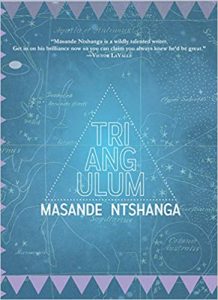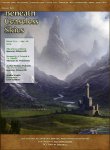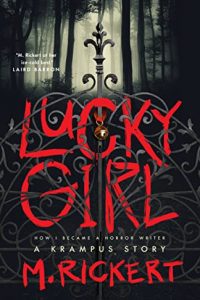Ian Mond Reviews Triangulum by Masande Ntshanga
 Triangulum, Masande Ntshanga (Two Dollar Radio 978-1937512774, $17.99, 367pp, tp) May 2019.
Triangulum, Masande Ntshanga (Two Dollar Radio 978-1937512774, $17.99, 367pp, tp) May 2019.
I was predisposed to enjoy Masande Ntshanga’s Triangulum. Some of my favourite books are “found manuscript” novels, including James Hogg’s The Private Memoirs and Confessions of a Justified Sinner, David Means’ Man Booker Prize longlisted Hystopia, and the granddaddy of them all, Mark Z. Danielewski’s breathtaking House of Leaves. Triangulum doesn’t feature the structural and typographical antics of House of Leaves, but both novels blend two different found media: for House of Leaves it’s a manuscript and a film, for Triangulum it’s two manuscripts and digitised audio anonymously sent to the South African National Space Agency (SANSA).
This material is introduced to us in a foreword by Doctor Naomi Buthelezi (a once science fiction author and winner of the Hugo and Nebula Awards) who, in 2040, is tasked by the Agency with casting a critical eye and checking the veracity of the documents. She discovers that what sets this material apart from the conspiracy-laden ravings frequently sent to SANSA is the “enormous amount of effort that had gone into the package” and that the author predicts the bombing of Table Mountain two months before the event. While the manuscripts and audio might have been penned and recorded by those who planned the explosion, (thus knowing about it in advance), Doctor Buthelezi recognises an authenticity and humanity to the account, which makes its pronouncement of the end of the world by 2050, if we don’t change our ways, all the more disturbing.
The first section of this found material introduces us to the anonymous author as a teenager living in the former independent state of Ciskei in the southeast of South Africa. We initially get to know her through a journal she kept in the latter part of 1999. Her entries cover familiar YA territory: a teenager exploring her own sexuality, struggling with the unexpected disappearance of her mother (four years previously) while, with the assistance of her aunty, caring for her sick father. It’s during the regression therapy sessions recorded in 2035, which alternate between the journal entries, that the fantastic and weird intrude into the narrative. We are taken back to 2002, where the author – now 17, her father deceased – is haunted by The Machine, a technology of unknown origin that oozes from the walls of her bedroom “with a mechanical hum, pulsing from between two moisture stains.” Our author is convinced that The Machine is linked both to the abduction of her mother (possibly by aliens) and the disappearance of three girls; that the message it keeps sending – a triangle pointed in different directions – is a clue as to their whereabouts. The ensuing search for the missing girls highlights one of the key concerns of the novel, the open wound of South Africa’s apartheid past and how a politician might leverage these deep divisions for personal and political gain. Here, in my ignorance, I was introduced to the Umkhonto We Sizwe, the armed wing of the African National Congress (co-founded by Nelson Mandela), and the bitter resentment toward those who allegedly collaborated with South Africa’s apartheid government. It’s messy and complicated and also very human, handled with care and intelligence by Ntshanga.
The second half of Triangulum sees our author in her forties, working for a privately owned firm acting on behalf of the government to dispense social welfare to the poor. She is seconded into a secret project, the brain-child of the company’s CEO, that plans to commodify the vast number of people living in poverty by establishing labour zones across the country. These communities are reminiscent of Octavia Butler’s “debt slaves” (Parable of the Sower) and would:
Introduce basic services, education and employment, while decreasing civilian movement to and from the zones, locking the residents in sites of indentured labour and consumption.
Our author also becomes associated with The Returners, eco-terrorists who stand opposed to the industrial and digitised revolution, and whose antecedents are linked to the author’s past. As with the first half of the novel, there’s plenty to work through here – the Returner’s Luddite philosophy, the coming of the Anthropocene, the insidious implementation of corporate slavery – that’s unsettling and foreshadows a dystopia that seems horribly inevitable.
Where the book falters is when Ntshanga is bound by his initial premise to bring everything back to a possible end-of-the-world scenario. The mystery surrounding this is, sadly, the least interesting facet of the novel, partly because the central idea feels lifted from The Day the Earth Stood Still, and partly because the revelation is delivered in a mad, anti-climactic rush in the final pages. It had me wondering why anyone, especially Doctor Buthelezi, would find the author’s apocalyptic prophecy even remotely convincing.
Still, as a coming-of-age story that neatly transitions into an adult novel about the deep rifts in South African society, about the exploitation of the poor by Corporate and Government interests, and about our complete disregard for the environment, Triangulum is a fascinating and thoughtful addition to the found-manuscript oeuvre.
Ian Mond loves to talk about books. For eight years he co-hosted a book podcast, The Writer and the Critic, with Kirstyn McDermott. Recently he has revived his blog, The Hysterical Hamster, and is again posting mostly vulgar reviews on an eclectic range of literary and genre novels. You can also follow Ian on Twitter (@Mondyboy) or contact him at mondyboy74@gmail.com.
This review and more like it in the June 2019 issue of Locus.
 While you are here, please take a moment to support Locus with a one-time or recurring donation. We rely on reader donations to keep the magazine and site going, and would like to keep the site paywall free, but WE NEED YOUR FINANCIAL SUPPORT to continue quality coverage of the science fiction and fantasy field.
While you are here, please take a moment to support Locus with a one-time or recurring donation. We rely on reader donations to keep the magazine and site going, and would like to keep the site paywall free, but WE NEED YOUR FINANCIAL SUPPORT to continue quality coverage of the science fiction and fantasy field.








